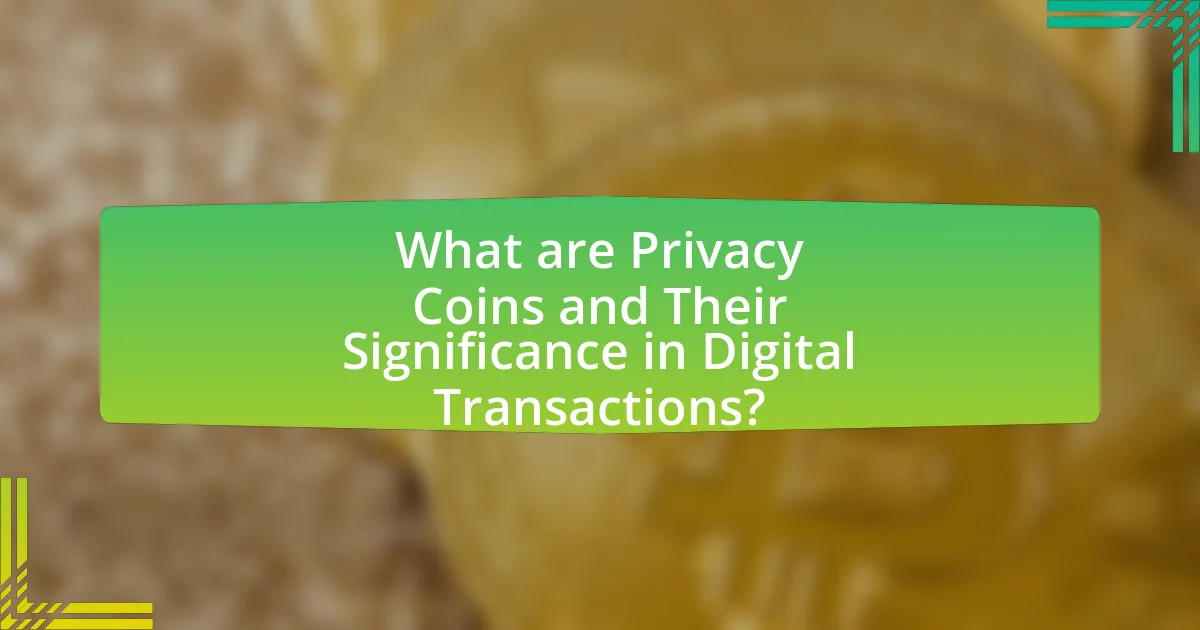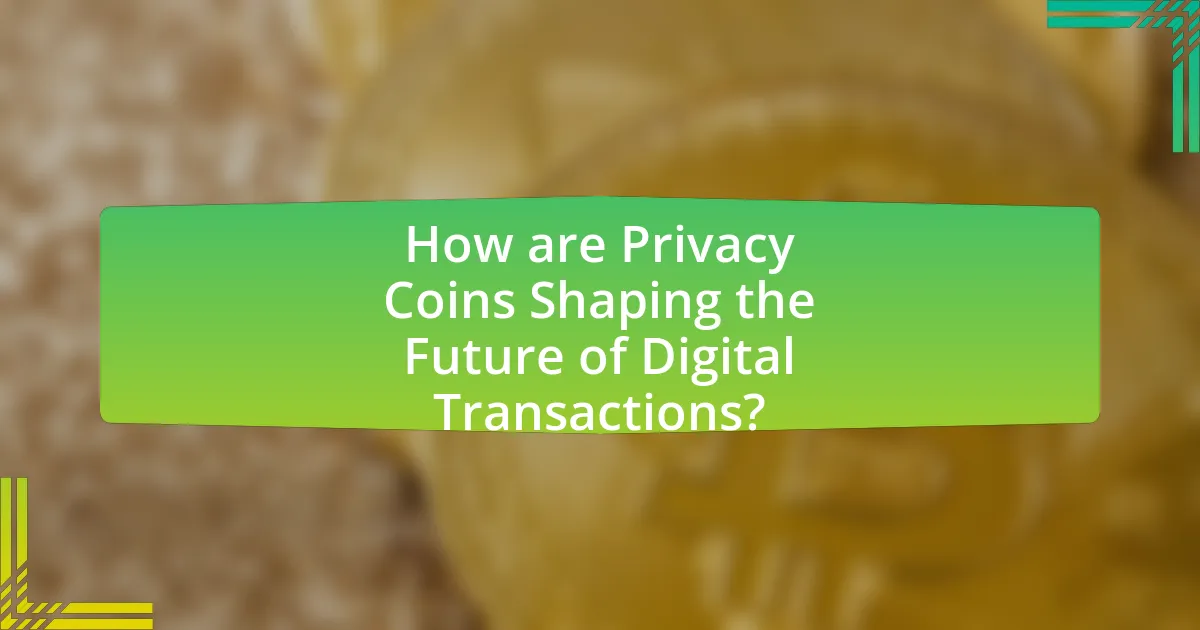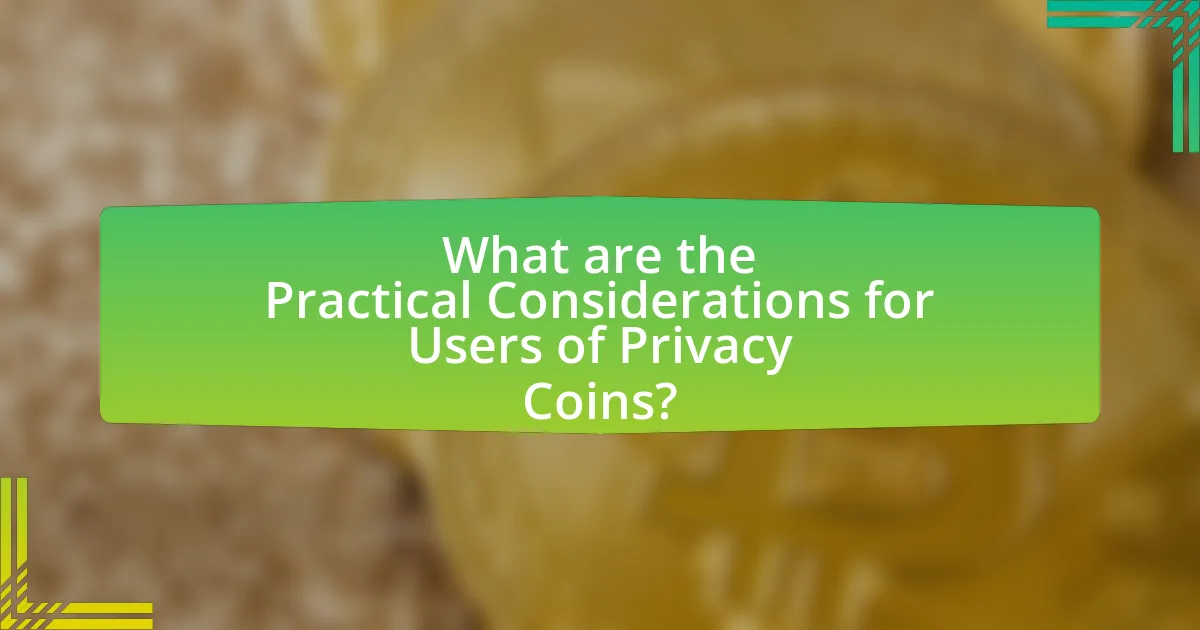Privacy coins are cryptocurrencies specifically designed to enhance user anonymity and transaction confidentiality in the digital financial landscape. This article explores the significance of privacy coins, such as Monero, Zcash, and Dash, highlighting their unique technologies like ring signatures and zero-knowledge proofs that obscure transaction details. It addresses the differences between privacy coins and traditional cryptocurrencies, the importance of anonymity in digital transactions, and the challenges these coins face, including regulatory scrutiny and security risks. Additionally, the article discusses the potential benefits of privacy coins for users, their role in protecting personal data, and the evolving trends that may influence their adoption in the future.

What are Privacy Coins and Their Significance in Digital Transactions?
Privacy coins are cryptocurrencies designed to provide enhanced privacy and anonymity for users in digital transactions. Unlike traditional cryptocurrencies like Bitcoin, which have transparent transaction histories, privacy coins utilize advanced cryptographic techniques to obscure transaction details, making it difficult to trace the sender, receiver, or transaction amount. This feature is significant in digital transactions as it addresses growing concerns over data privacy and surveillance, allowing users to conduct transactions without revealing their financial activities. For instance, Monero, a leading privacy coin, employs ring signatures and stealth addresses to ensure transaction confidentiality, which has led to increased adoption among users seeking financial privacy.
How do Privacy Coins differ from traditional cryptocurrencies?
Privacy coins differ from traditional cryptocurrencies primarily in their focus on anonymity and transaction privacy. While traditional cryptocurrencies like Bitcoin and Ethereum allow for public transaction records on a blockchain, privacy coins such as Monero and Zcash utilize advanced cryptographic techniques to obscure transaction details, making it difficult to trace the sender, receiver, or transaction amount. For instance, Monero employs ring signatures and stealth addresses to enhance user privacy, whereas Zcash offers a shielded transaction option that encrypts transaction data. This fundamental difference in privacy features positions privacy coins as a distinct category within the cryptocurrency landscape, catering to users who prioritize confidentiality in their digital transactions.
What technologies enable privacy features in these coins?
Privacy features in cryptocurrencies are primarily enabled by technologies such as zero-knowledge proofs, ring signatures, and stealth addresses. Zero-knowledge proofs allow one party to prove to another that a statement is true without revealing any information beyond the validity of the statement itself, enhancing transaction confidentiality. Ring signatures obscure the identities of senders by mixing their transactions with others, making it difficult to trace the origin of funds. Stealth addresses generate unique, one-time addresses for each transaction, ensuring that the recipient’s address cannot be linked to their identity or previous transactions. These technologies collectively enhance user privacy and security in digital transactions.
Why is anonymity important in digital transactions?
Anonymity is important in digital transactions because it protects users’ personal information and financial data from unauthorized access and misuse. In an era where data breaches and identity theft are prevalent, maintaining anonymity helps safeguard individuals’ privacy and security during online transactions. For instance, a study by the Identity Theft Resource Center reported that in 2020, there were over 1,100 data breaches, exposing millions of personal records. This highlights the necessity for anonymity to mitigate risks associated with digital financial activities.
What are the most popular Privacy Coins available today?
The most popular privacy coins available today are Monero, Zcash, and Dash. Monero is widely recognized for its strong privacy features, utilizing ring signatures and stealth addresses to obscure transaction details. Zcash offers selective transparency through zk-SNARKs, allowing users to choose whether to disclose transaction information. Dash incorporates PrivateSend, which mixes coins to enhance user anonymity. These coins are frequently discussed in the context of their ability to provide financial privacy in an increasingly digital world.
What unique features do Monero, Zcash, and Dash offer?
Monero, Zcash, and Dash each offer distinct features that enhance privacy in digital transactions. Monero utilizes ring signatures, stealth addresses, and confidential transactions to obscure sender and receiver identities, making it highly private and untraceable. Zcash employs zero-knowledge proofs, specifically zk-SNARKs, allowing transactions to be verified without revealing sender, receiver, or transaction amount, thus providing optional privacy. Dash features InstantSend for rapid transactions and PrivateSend, which mixes coins to obfuscate transaction history, enhancing user anonymity. These unique features position Monero, Zcash, and Dash as significant players in the privacy coin sector, catering to users seeking enhanced confidentiality in their digital transactions.
How do these coins maintain user privacy?
Privacy coins maintain user privacy primarily through advanced cryptographic techniques that obscure transaction details. For instance, coins like Monero utilize ring signatures, stealth addresses, and confidential transactions to ensure that sender and receiver identities, as well as transaction amounts, remain hidden. This approach contrasts with traditional cryptocurrencies, where transaction data is publicly accessible on the blockchain. The effectiveness of these privacy measures is evidenced by Monero’s consistent ranking as one of the most private cryptocurrencies, with its technology being continuously updated to counteract potential de-anonymization efforts.
What challenges do Privacy Coins face in the current financial landscape?
Privacy coins face significant regulatory scrutiny in the current financial landscape, which poses challenges to their adoption and use. Governments and financial authorities are increasingly concerned about the potential for money laundering, tax evasion, and other illicit activities associated with anonymous transactions. For instance, the Financial Action Task Force (FATF) has issued guidelines urging countries to regulate or ban privacy coins to ensure compliance with anti-money laundering (AML) and counter-terrorism financing (CTF) measures. Additionally, exchanges may be reluctant to list privacy coins due to the risk of regulatory penalties, further limiting their accessibility and market growth.
How do regulatory concerns impact the adoption of Privacy Coins?
Regulatory concerns significantly hinder the adoption of Privacy Coins by creating an environment of uncertainty and potential legal repercussions for users and developers. Governments worldwide are increasingly scrutinizing cryptocurrencies, particularly those that offer enhanced privacy features, due to their association with illicit activities such as money laundering and tax evasion. For instance, the Financial Action Task Force (FATF) has issued guidelines urging countries to regulate or ban privacy coins, which has led to exchanges delisting these assets to comply with local laws. This regulatory pressure discourages mainstream adoption, as businesses and individuals fear legal consequences and compliance challenges.
What are the security risks associated with using Privacy Coins?
Privacy coins, such as Monero and Zcash, pose several security risks, primarily due to their anonymity features that can facilitate illicit activities. The obfuscation of transaction details makes it challenging for law enforcement to trace illegal transactions, which can lead to increased use by criminals for money laundering, drug trafficking, and tax evasion. Additionally, the lack of regulatory oversight can expose users to scams and fraud, as the anonymity can attract malicious actors who exploit unsuspecting individuals. Furthermore, privacy coins can be vulnerable to specific attacks, such as network analysis and blockchain analysis, which may compromise user privacy if not adequately protected. For instance, a study by the University of California, Berkeley, highlighted that certain privacy coins could be de-anonymized through advanced analytical techniques, revealing transaction patterns and user identities.

How are Privacy Coins Shaping the Future of Digital Transactions?
Privacy coins are shaping the future of digital transactions by providing enhanced anonymity and security for users. These cryptocurrencies, such as Monero and Zcash, utilize advanced cryptographic techniques to obscure transaction details, making it difficult for third parties to trace the flow of funds. This increased privacy addresses growing concerns over surveillance and data breaches, as evidenced by a 2021 report from Chainalysis, which noted a significant rise in the use of privacy coins amid increasing regulatory scrutiny of traditional cryptocurrencies. As digital transactions evolve, the demand for privacy-focused solutions is likely to grow, influencing the development of financial systems that prioritize user confidentiality and protection against fraud.
What potential benefits do Privacy Coins bring to users?
Privacy coins provide users with enhanced anonymity and security in their transactions. These cryptocurrencies, such as Monero and Zcash, utilize advanced cryptographic techniques to obscure transaction details, making it difficult for third parties to trace the flow of funds. For instance, Monero employs ring signatures and stealth addresses, which ensure that both the sender and receiver remain unidentifiable, while the transaction amounts are also concealed. This level of privacy can protect users from surveillance and potential financial discrimination, as well as safeguard sensitive information in a digital economy increasingly focused on data privacy.
How can Privacy Coins enhance financial freedom and security?
Privacy coins enhance financial freedom and security by enabling anonymous transactions that protect user identities and financial data. These cryptocurrencies, such as Monero and Zcash, utilize advanced cryptographic techniques to obscure transaction details, making it difficult for third parties to trace the flow of funds. This anonymity fosters a sense of financial autonomy, allowing individuals to transact without fear of surveillance or censorship. For instance, a study by the Cambridge Centre for Alternative Finance indicates that privacy coins can empower users in regions with oppressive regimes, where financial transactions are monitored and controlled. By safeguarding personal information, privacy coins contribute to a more secure and liberated financial ecosystem.
What role do Privacy Coins play in protecting user data?
Privacy coins play a crucial role in protecting user data by enabling anonymous transactions and obscuring transaction details from public view. These cryptocurrencies, such as Monero and Zcash, utilize advanced cryptographic techniques like ring signatures and zero-knowledge proofs to ensure that transaction amounts, sender, and receiver identities remain confidential. This level of privacy helps users safeguard their financial information from surveillance and potential misuse, thereby enhancing overall data protection in digital transactions.
How might the adoption of Privacy Coins evolve in the coming years?
The adoption of Privacy Coins is likely to increase as regulatory frameworks evolve and consumer demand for financial privacy grows. As governments implement stricter regulations on cryptocurrency transactions, individuals may turn to Privacy Coins to maintain anonymity and protect their financial data. For instance, the rise of data privacy concerns and incidents of data breaches have heightened awareness around personal financial security, driving interest in coins like Monero and Zcash. Additionally, advancements in technology may enhance the usability and accessibility of these coins, further encouraging their adoption among users seeking privacy in digital transactions.
What trends indicate a growing acceptance of Privacy Coins?
Growing acceptance of Privacy Coins is indicated by increasing regulatory discussions, rising adoption in online marketplaces, and enhanced privacy features in blockchain technology. Regulatory bodies are beginning to acknowledge Privacy Coins, with some jurisdictions exploring frameworks that could legitimize their use, reflecting a shift towards acceptance. Additionally, online platforms and e-commerce sites are increasingly accepting Privacy Coins as payment options, demonstrating their practical utility and demand. Furthermore, advancements in privacy technology, such as zk-SNARKs and Confidential Transactions, are being integrated into mainstream cryptocurrencies, enhancing user privacy and attracting more users to Privacy Coins. These trends collectively highlight a significant movement towards the acceptance and integration of Privacy Coins in the digital economy.
How could technological advancements influence Privacy Coin usage?
Technological advancements could significantly enhance Privacy Coin usage by improving transaction anonymity and security features. Innovations such as zero-knowledge proofs and advanced cryptographic techniques enable users to conduct transactions without revealing their identities or transaction details. For instance, the implementation of zk-SNARKs in cryptocurrencies like Zcash allows for fully private transactions, which can increase user adoption. Additionally, advancements in blockchain scalability, such as layer-2 solutions, can facilitate faster and cheaper transactions, making Privacy Coins more appealing for everyday use. As privacy concerns grow in the digital age, these technological improvements are likely to drive greater acceptance and integration of Privacy Coins in various financial ecosystems.

What are the Practical Considerations for Users of Privacy Coins?
Users of privacy coins must consider regulatory compliance, security risks, and usability challenges. Regulatory compliance is crucial as many jurisdictions are tightening laws around cryptocurrencies, which can affect the legality of using privacy coins. Security risks include potential vulnerabilities in the technology that could expose user identities or funds, as evidenced by past incidents where privacy coin networks faced attacks. Usability challenges arise from the complexity of transactions and the need for users to understand how to effectively manage their privacy settings, which can deter less experienced users. These considerations highlight the importance of being informed and cautious when engaging with privacy coins in the evolving landscape of digital transactions.
What best practices should users follow when using Privacy Coins?
Users should follow several best practices when using privacy coins to enhance their security and anonymity. First, users should utilize a secure wallet that supports privacy features, such as hardware wallets or wallets with strong encryption. This is crucial because secure wallets protect private keys from potential theft or hacking.
Second, users should regularly update their software to the latest versions to mitigate vulnerabilities. Keeping software updated is essential as developers often release patches that address security flaws.
Third, users should avoid reusing addresses for transactions, as this can compromise anonymity. By generating new addresses for each transaction, users can better obscure their transaction history.
Fourth, users should consider using mixing services or coin tumblers to further obfuscate transaction trails. These services can enhance privacy by blending coins from multiple users, making it difficult to trace the origin of funds.
Lastly, users should educate themselves about the legal implications of using privacy coins in their jurisdiction, as regulations can vary significantly. Understanding local laws helps users navigate potential legal risks associated with privacy coin transactions.
How can users ensure their transactions remain private and secure?
Users can ensure their transactions remain private and secure by utilizing privacy coins, which employ advanced cryptographic techniques to obfuscate transaction details. Privacy coins like Monero and Zcash use features such as ring signatures and zero-knowledge proofs, respectively, to hide sender and receiver identities as well as transaction amounts. According to a study published in the Journal of Cryptology, these technologies significantly enhance transaction anonymity compared to traditional cryptocurrencies. Additionally, users should employ secure wallets, enable two-factor authentication, and utilize Virtual Private Networks (VPNs) to further protect their transaction data from potential surveillance and hacking attempts.
What tools and resources are available for managing Privacy Coins?
Tools and resources available for managing Privacy Coins include specialized wallets, privacy-focused exchanges, and blockchain explorers. Wallets such as Monero GUI and Wasabi Wallet provide secure storage and transaction features tailored for privacy coins. Privacy-focused exchanges like Bisq and LocalMonero facilitate trading without compromising user anonymity. Blockchain explorers, such as MoneroBlocks and Blockchair, allow users to track transactions while maintaining privacy. These tools collectively enhance the management and usability of Privacy Coins, ensuring secure transactions and user anonymity in digital transactions.
What common misconceptions exist about Privacy Coins?
Common misconceptions about privacy coins include the belief that they are solely used for illegal activities, that they guarantee complete anonymity, and that they are not traceable. While privacy coins like Monero and Zcash are often associated with illicit transactions, they are also utilized for legitimate purposes such as protecting user privacy in financial transactions. Furthermore, while privacy coins enhance anonymity through advanced cryptographic techniques, they do not provide absolute anonymity, as sophisticated analysis can sometimes de-anonymize transactions. Additionally, privacy coins can be traced to some extent, as blockchain analysis tools have evolved to track transactions, challenging the notion that they are entirely untraceable.
How can users differentiate between myths and facts regarding Privacy Coins?
Users can differentiate between myths and facts regarding Privacy Coins by researching credible sources and understanding the technology behind these coins. For instance, many myths claim that Privacy Coins are solely used for illegal activities; however, studies, such as the one published by the Cambridge Centre for Alternative Finance, indicate that legitimate use cases exist, including privacy protection for individuals in oppressive regimes. Additionally, users should examine the underlying technology, such as zero-knowledge proofs, which provide verifiable privacy without revealing transaction details. By comparing these facts with common misconceptions, users can form a more accurate understanding of Privacy Coins.
What should users know about the legal implications of using Privacy Coins?
Users should know that the legal implications of using Privacy Coins can vary significantly by jurisdiction and may involve regulatory scrutiny. Privacy Coins, such as Monero and Zcash, are designed to enhance user anonymity, which can lead to concerns regarding money laundering, tax evasion, and other illicit activities. For instance, in the United States, the Financial Crimes Enforcement Network (FinCEN) has issued guidance indicating that transactions involving Privacy Coins may be subject to the same anti-money laundering (AML) regulations as traditional cryptocurrencies. Additionally, some countries have outright banned or restricted the use of Privacy Coins due to their potential for facilitating illegal activities. Therefore, users must stay informed about local laws and regulations to ensure compliance and avoid legal repercussions.






